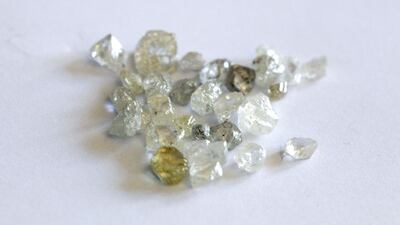The Russian diamond mining monopoly Alrosa has reported a 12 per cent increase on the year in revenue for 2013 to US$4.67 billion due to increased rough diamond sales.
The firm, which last week signed an agreement with Dubai Diamond Exchange (DDE), said it sold 15 per cent more diamonds last year compared with 2012 at 38 million carats which “offset the lack of price growth in 2013”.
Net profit amounted to $1.06bn, down 5 per cent on 2012 “mainly due to increased exchange loss and revaluation of the dollar denominated part of the group’s credit portfolio as a result of ruble weakening in 2013”, it said.
“Despite the lack of a price growth in the diamond market, Alrosa managed to increase revenue and retain a high level of profitability,” the company chief executive Fyodor Andreev said late on Tuesday.
“We implemented the plans for construction of new production facilities and modernisation of the existing ones. Alrosa’s successful IPO … in 2013 proved a high level of confidence in the company from long-term investors and showed capitalization growth prospects.”
Alrosa – the world’s biggest such diamond mining group by volume – and the DDE last week signed a memorandum of understanding (MoU) aimed at improving relations between the company and the UAE diamond community.
The document was signed in Dubai by Andrey Polyakov, the Alrosa vice president, and Peter Meeus, the chairman of the DDE, in the presence of Egor Borisov, the president of the Russian federal subject Sakha, and Ahmed Bin Sulayem, the executive chairman of the Dubai Multi Commodities Centre.
Mr Borisov presides over the huge Russian region also known as Yakutia that is larger than Argentina and where approximately 26 per cent of the world’s diamonds come from, according to the trade delegation of the Russian Federation in the United Kingdom, which represents economic interests of Russia in the country.
The UAE imported $68 million worth of diamonds from Yakutia in 2013.
“I think investors from the UAE will have a good opportunity to take part in investment projects such as the development of infrastructure, tourism, new technologies and the establishment of new industrial locations to produce unique jewellery products,” said Mr Borisov.
The MoU will enable the relavant bodies to exchange expertise and information regarding the implementation of the Kimberley Process certification scheme and share information on market intelligence, they said.
The Kimberley Process was set up in 2003 to ensure that diamond purchases were not financing violence by rebel movements and their allies seeking to undermine legitimate governments.
In the second half of this year Alrosa plans to resume business through its subsidiary sales company Arcos East in Dubai, which halted trading in 2009 following the global financial crisis.
“The Emirates, and especially Dubai, is rapidly emerging as one of the new leading centres of the diamond trade due to the city’s ideal geographic location between the producing and consuming countries,” said Mr Borisov.
“In 2001 there was not nearly as much diamond trade in Dubai and the total trade at that time amounted to $5m. Over 10 years it has rocketed to more than $39bn,” he said.
Mr Sulayem also pointed to growing trade with Africa as a driver for Dubai’s diamond trade.
“Thanks to the boost in business from Africa and our rapid recovery after the global financial crisis, Dubai ranks on par with the world’s diamond trade centres,” he said.
“The cooperation with Alrosa that supplies high-quality diamonds will complement the large availability of rough on the Dubai market and hence will contribute to our leading role.”
Damas, the jewellery and watch retailer, recently held a two-day diamond masterclass hosted by Forevermark, a diamond brand of the De Beers Group, to build awareness and develop diamond knowledge among its key customers and employees in the UAE.
“It is very important for people to be properly educated on diamonds and we are proud to have been able to work with Forevermark to provide that benefit for our customers and staff,” said Rula Zaidan, the general manager of marketing for Damas.
Meanwhile, De Beers is seeking steady and consistent gains in diamond prices.
“Our dream scenario is a gentle escalation of prices every year in tune with an appreciation in demand for polished,” said Howard Davies, commercial head for De Beers’ global sales.
The biggest producer of diamonds isn’t there yet. Prices for rough, or uncut, gems jumped about 8 per cent in the first quarter after a 10 per cent gain last year as the US economy recovered and Chinese consumers bought more.
business@thenational.ae
Follow us on Twitter @Ind_Insights

